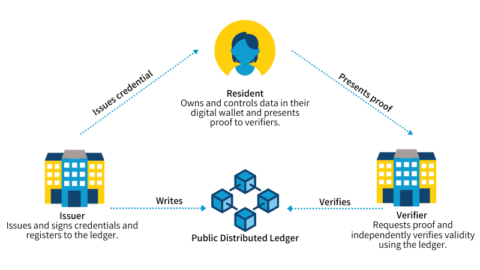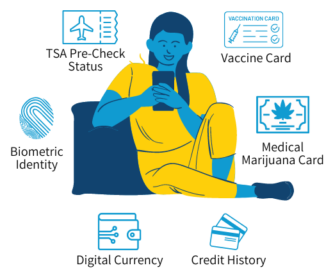Don’t Let These Myths Cause Your Agency to Miss Out on the Benefits of Decentralized Identity Solutions
Don’t Let These Myths Cause Your Agency to Miss Out on the Benefits of Decentralized Identity Solutions
Governments use a patchwork of approaches to identify residents: vital records like birth certificates, paper-based ID cards like driver’s licenses, logins for specific government services, and so on. This crazy-quilt approach has downsides for agencies and residents alike.
Agencies need to independently verify individuals each time they apply for new services. They then need to maintain and protect databases of resident data. Residents, for their part, must provide the same credentials over and over, and they worry about the privacy of that data. Meanwhile, they have little control over how their information is used.
That’s why more agencies are eyeing digitized approaches. In fact, one-half of U.S. states and one-third of national governments will offer mobile-based identity wallets by 2024, Gartner predicts. With the right digital strategy, agencies can benefit from more efficient and secure identity management, and residents can benefit from better government experiences and control over their data.
SSI for Simplified, Secure Resident Identities
One of the most promising approaches to resident identity management is self-sovereign identity (SSI), also called decentralized identity. Decentralized identity uses a distributed public ledger (or blockchain) to verify resident credentials. Across industries, uptake of decentralized identity solutions is expected to skyrocket at a compound annual rate of 89% through 2027.
But as with any new technology, some misperceptions have emerged. Here are five common myths of SSI – along with the facts that can enable your agency to gain the full benefits of decentralized identity:
Myth: Decentralized identity is less secure.
Fact: A decentralized model means identify theft is extremely unlikely.
Until now, governments have needed to collect, validate, and store massive amounts of personal identifiable information (PII). That makes agencies a prime target for ransomware and data theft. In fact, government is the sector most targeted by hackers, accounting for 48% of all cyberattacks, according to Microsoft.
 SSI eliminates many of those security risks though its decentralized model. With an effective decentralized identity solution, PII is stored on the resident’s smartphone in a digital vault protected by military-grade encryption. Resident data is validated through the public ledger and shared with agencies through tamper-evident communication channels.
SSI eliminates many of those security risks though its decentralized model. With an effective decentralized identity solution, PII is stored on the resident’s smartphone in a digital vault protected by military-grade encryption. Resident data is validated through the public ledger and shared with agencies through tamper-evident communication channels.
Because agencies no longer need to store vast amounts of PII, there’s little incentive for cyber attackers to hack into their systems. They can slash the threat of ransomware and reduce the cost of database management and security. What’s more, true identity theft becomes nearly impossible, so resident privacy is better protected.
Myth: Users have less control over their information.
Fact: Residents can grant or revoke access to their data on demand.
Decentralized identity gives residents control over their PII. Because residents can grant or revoke access to their information based on their own preferences, no agency can access their data without their consent.
Residents also get a much better government experience. Their credentials are already verified through the distributed ledger, so they don’t have to re-submit their data every time they want to use a new government service. Just as important, they don’t have to worry about whether each agency is maintaining a secure system or sharing data without their knowledge.
Myth: The technology isn’t ready for prime time.
Fact: Decentralized identity is being piloted today.
 There are a broad range of use cases for decentralized identity:
There are a broad range of use cases for decentralized identity:
- Resident services – Voter registration, government assistance, passport services, and professional and recreational licenses
- Public health – Vital records management, health and nutrition assistance, childcare, and child support
- Transportation – Driver’s licenses, vehicle registration, vehicle inspection, fines, and fees
- Taxation and finance – Tax filing, tax payments, and online payments
- Business support – Permits and licenses, inspections and certifications, funding, and loans
- Education – Applications and enrollment, financial aid, and credits and program completions
The Maryland Medical Cannabis Commission has launched a proof of concept for decentralized identity. The initiative will result in a next-generation, digital medical marijuana card. Built on the Voyatek Decentralized Identity for Government (DIG) platform, the solution leverages distributed ledger technology to allow the Commission to verify resident PII without storing or managing any data. The program is the first of numerous decentralized identity projects for the state.
Myth: Decentralized identity solutions won’t be accessible for all residents.
Fact: SSI can eliminate barriers while maintaining privacy.
Manual, repetitive verification of PII, plus redundant, agency-unique storage of data, throw up roadblocks that prevent residents from consuming services and limit them from having a say in what happens to their data. Those barriers also hinder agencies from fulfilling their missions.
Self-sovereign identity solutions not only improve security and data privacy, but—implemented correctly—can improve equity and accessibility for all residents. For individuals who need government services the most, providing proof of identity can be incredibly difficult. Roughly 11% of the population, and 25% of the minority population, has no government issued ID. Physical documents like birth certificates or social security cards require physical space and can be easily lost, damaged, or destroyed.
At the same time, agencies get the resident data they need, when they need it. They can quickly and cost-effectively validate PII for specific purposes, without the need to maintain and protect data they don’t require. Ultimately, they can build trust in government, assuring residents that their data is private while delivering exceptional government experiences.

